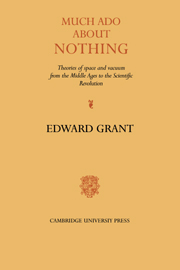 Much Ado about Nothing
Much Ado about Nothing Book contents
- Frontmatter
- Contents
- Preface
- Part I Intracosmic space
- 1 Aristotle on void space
- 2 Medieval conceptions of the nature and properties of void space
- 3 The possibility of motion in void space
- 4 Nature's abhorrence of a vacuum
- Part II Infinite void space beyond the world
- Part III Summary and reflections
- Notes
- Bibliography
- Index
1 - Aristotle on void space
Published online by Cambridge University Press: 07 October 2011
- Frontmatter
- Contents
- Preface
- Part I Intracosmic space
- 1 Aristotle on void space
- 2 Medieval conceptions of the nature and properties of void space
- 3 The possibility of motion in void space
- 4 Nature's abhorrence of a vacuum
- Part II Infinite void space beyond the world
- Part III Summary and reflections
- Notes
- Bibliography
- Index
Summary
In arriving at his definition of the place of a body as “the boundary [or inner surface] of the containing body at which it is in contact with the contained body,” Aristotle had occasion to reject three other possibilities, namely that place is (1) shape or form; (2) the matter of a body; and (3) the extension between the bounding surfaces of a containing body. The last of these represented the concept that place is a three-dimensional void space. By defining void as “place bereft of body,” it was easy to infer that a void place is something distinct from the bodies that occupy it. Indeed because most people believed “that everything is somewhere and in place,” it would seem that, like Hesiod's chaos, place, or space, would necessarily precede the things that must move and rest in it. “If this is its nature,” Aristotle declared, “the potency of place must be a marvellous thing, and take precedence of all other things. For that without which nothing else can exist, while it can exist without the others, must needs be first; for place does not pass out of existence when the things in it are annihilated.”
If Hesiod and the atomists could find justification for the existence of such a separate, empty space, Aristotle found it an unintelligible conception from which only absurdities and impossibilities followed. For if place or space were three-dimensional, it would be a body.
- Type
- Chapter
- Information
- Much Ado about NothingTheories of Space and Vacuum from the Middle Ages to the Scientific Revolution, pp. 5 - 8Publisher: Cambridge University PressPrint publication year: 1981


